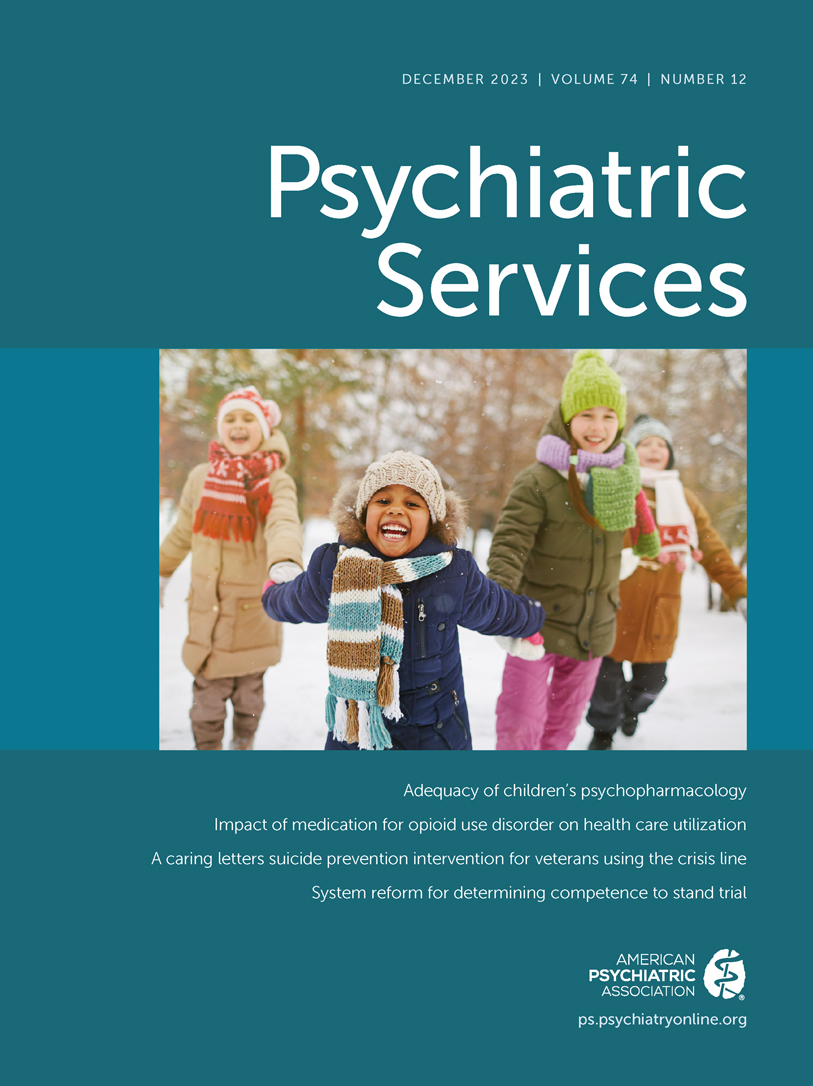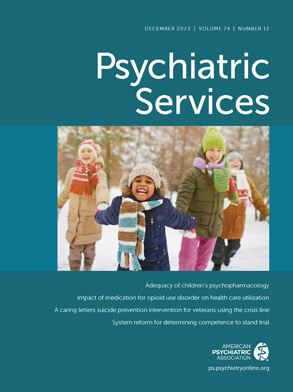In June 2022, the American Medical Association’s (AMA’s) House of Delegates adopted a resolution recognizing voting as a social determinant of health, citing a correlation between civic engagement and positive health outcomes (
1). Although the resolution centers on general health, voting is also associated with positive mental health outcomes and has the potential to influence other social determinants of mental health.
Voting Is a Social Determinant of Mental Health
Recent longitudinal evidence shows that civic engagement, including voting, volunteering, and social activism, is associated with decreased depressive symptoms and risky health-related behaviors (
2). Focus group data indicate that political participation is an important element of psychiatric recovery (
3). Civically strong communities have lower suicide rates, suggesting that civic engagement may insulate against structural drivers of suicide risk (
4). Election outcomes affect access to housing, health care, transportation, neighborhood safety, and other public resources. Lack of access to these social determinants of health is associated with poor mental health outcomes (
5). Civic engagement, including voting, has implications for policies that address these and other social determinants of health. This emerging evidence, although limited, points to an important relationship between civic engagement and improved mental health, suggesting that voting as a form of civic engagement is a social determinant of mental health.
Patients With Psychiatric Illness Face Voting Barriers
Persons with psychiatric illness are less likely to vote than are people in the general population or people with other types of health problems (
6,
7). A Rutgers University report found that individuals with mental or cognitive impairments had the lowest voting rates of all people with disabilities in the 2016 and 2018 elections (
8). Some symptoms of mental illness, such as anergia and amotivation in depressive disorders, may directly decrease a person’s likelihood of voting (
9). However, there is evidence that several structural and systemic factors also contribute to voting disparities.
In a U.K. study, psychiatric inpatients were half as likely as people in the general population to be registered to vote. Of the patients who were not registered, nearly all were unaware of their right to vote, especially patients with long hospital stays (
6). In a population of adult psychiatric inpatients at the Pennsylvania Psychiatric Institute, 52% reported voting in the 2016 presidential election, compared with 61% of all voting-age Pennsylvanians (
7,
10). Although a lack of awareness of voting ability could be a sequela of psychiatric illness, it also reflects the reality that many psychiatric patients face barriers when trying to exercise their right to vote. Many U.S. states disenfranchise people with psychiatric disabilities from voting: half of states prohibit voting by individuals with court-determined incapacity, 11 exclude “idiots” and “insane persons,” and 11 bar individuals “under guardianship” (
11).
These findings suggest that although symptoms of mental illness can affect voting behavior, structural forces and lack of knowledge further impede patients from exercising their right to vote, contributing to voting disparities. Other structural stressors to which patients with mental illness may be exposed, such as racism and poverty, have also been shown to influence voting behavior of such patients (
12,
13). Voting disparities among populations with mental illness could therefore reflect intersections of systematic disenfranchisement related to disability, racism, and wealth inequality.
Encouraging Voting Can Empower Both Patients and Providers
In the current sociocultural context, voting is a charged topic. Voting at the polls can induce stress, even for people without mental illness, and increased political polarization across the United States has been linked to rising depression and anxiety (
14,
15). Psychiatrists might be apprehensive, therefore, about being perceived as pushing a political or moral agenda. Asking psychiatrists to address voting issues as part of providing care may leave them feeling further daunted by an already long list of clinical tasks.
We argue that social and political engagements naturally complement our expertise. The recovery movement has long asserted that psychopharmacology and psychotherapy go only so far and encourages psychiatric practitioners to think more holistically. Our clinical practice, at the intersection of neuroscience, sociology, medicine, philosophy, and law, has positioned us to find creative ways to address social determinants of health. In clinical care, we routinely address complex and distressing social determinants, such as financial or housing instability, food insecurity, and barriers to treatment access. Importantly, we do so not by telling patients what they should do, but rather by collaborating with them to articulate their recovery goals and to systematically address barriers and leverage facilitators to reach these goals. If, as community psychiatrists, we are experts in proactively working with patients to manage social stressors affecting their mental health, we can also apply these skills to empower our patients toward civic engagement.
In our experience, the path through the quagmire of voting among psychiatric patients is not as fraught as it may seem. Engaging with patients around their voting plans and behaviors is a practical strategy for addressing barriers to voting (
7,
16). These conversations can be a part of routine practice across levels of care and throughout the calendar year. Questions such as, “Do you have a plan to vote in the next election?” can be incorporated into the social history interview or asked during hospital admission or discharge (
16). Our team at an urban psychiatric hospital has nearly 3 years of experience running a voter engagement program in a psychiatric setting. We have engaged 248 patients in voter support activities. For example, we helped 54 patients to register to vote, assisted 95 in finding their polling place, and supported 45 in requesting mail-in ballots (unpublished data as of December 2022).
We have also found that psychiatric encounters can be opportunities to address a patient’s barriers to voting—such as completing a voter registration application, identifying a polling place, or resolving transportation difficulties. Organization-level initiatives can include sharing communications about voting with patients and personnel or conducting a voter registration drive. Importantly, all interventions can and must be conducted in a nonpartisan manner. In our experience, engagement of clinical colleagues, institutional commitment, and national resources such as Vot-ER (
16) enhance the efficiency and success of these efforts; Vot-ER is a nonpartisan organization that provides tools such as QR codes to smoothly integrate voter registration into health care delivery.
Talking with patients about voting is a tangible way for psychiatric practitioners to promote community health and empower patients to exercise a recovery-oriented behavior that includes voting. The AMA Principles of Medical Ethics note that a physician should “recognize a responsibility to participate in activities contributing to the improvement of the community and the betterment of public health” (
17). Voting is a social determinant of health at both the individual and the community level and influences political determinants of health at the structural level (
18). If supporting civic engagement is a simple and effective way to benefit patients’ health, we conclude that psychiatrists have a social and an ethical obligation to encourage patients to exercise their right to vote and to empower them with the tools to do so.

